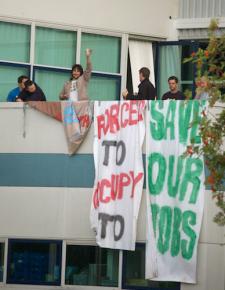Workers occupy UK factory
looks at the impact of an occupation at a British wind turbine factory.
ABOUT TWO dozen British workers have been occupying a factory on the Isle of Wight, just off the south coast of England, in a fight to save more than 600 jobs.
The workers are employees of Vestas Windsystems, a Danish company that recently announced it intended to close the plant--the only wind turbine factory in Britain. But rather than allow the factory to close on July 31, these workers decided to take over a first-floor office, and have remained there for nearly two weeks.
The Vestas workers have every reason to be angry. Although their bosses claim that demand for the turbines is falling across northern Europe, the company recently reported a 59 percent increase in sales to over $1.4 billion. Even more ironically, the British government had just announced a subsidy of more than $10 million to help Vestas build a new research-and-development facility.
While the company is raking in the money, the closure of the Vestas plant--which is one of the largest employers of skilled labor in the region--would have a devastating impact on the local economy.

Vestas is doing everything it can to break the occupation. On July 28, the company announced it had fired 11 workers suspected of taking part in the action. To add insult to injury, these workers received their redundancy letters hidden under slices of pizza delivered to the factory for their evening meal.
Vestas and the local police have prevented supporters from bringing food and water to the workers, leading to difficult conditions inside the plant. When one worker chose to leave the factory, he was checked for low blood-sugar levels and advised to go to the hospital for further checks. Several people have been arrested outside the plant, apparently for attempting to supply the occupation.
But Vestas isn't getting everything its own way. The day after the firings were announced, a local court rejected the company's attempt to get an eviction order for the protesting workers. This means that the occupation will continue at least into the first week of August, well beyond the planned closure date of July 31.
THE VESTAS workers have made a clear attempt to link the fight for jobs to the fight for sustainability and environmental justice. They have demanded that Ed Miliband, the Energy and Climate Change Secretary in Gordon Brown's New Labour government, travel to the factory and speak with them "face to face."
Like Barack Obama's Democratic Party administration in the U.S., New Labour has committed itself to creating thousands of "green jobs" while allowing the recession to throw millions out of work. The situation at Vestas shows that these governments' commitment to free-market principles is incompatible with a serious effort to prevent climate change.
Significantly, the solidarity campaign for the Vestas workers demonstrates the potential for concrete collaboration between labor and the environmental movement.
Activists from the British organization Campaign against Climate Change have played a leading role in protests to support the occupation, and they have been joined by the left-led National Union of Rail, Maritime and Transport Workers (RMT). The union's leader, Bob Crow, said that the planned closure made "a mockery of the government's stated objectives on green employment and renewable energy."
Although Vestas is not a union shop, the occupation reveals the ability of workers to fight back, and shows how struggles like this one can give confidence even to those who have never thought of themselves as militants.
A small number of Vestas workers joined the RMT union and began to organize in the factory. When the closure was announced, this group was able to win larger numbers of workers to their strategy for a fightback.
"I've never done anything like this in my life, and there was that part of me that thought they're a big company, and they're going to annihilate us in court," one of the workers told a BBC reporter. "But to hear that news [of the court victory] yesterday was absolutely fantastic and boosted everyone's morale."
The Vestas occupation is the latest in a ripple of factory occupations that has spread around the world. In December, workers at Chicago's Republic Windows & Doors won a huge victory when they took over their factory to demand severance pay after the plant was closed.
In a similar action, workers at three Visteon auto parts plants in Britain occupied their factories in March and April after they were given just a few minutes' notice that their factory was being shuttered. Like the workers at Republic, their militant action won much-improved redundancy payments. France has seen similar protests, and workers at the SsangYong Motor factory in South Korea are currently in occupation, and have engaged in determined self-defense against police attempts to evict them.
Beyond this, the Vestas occupation reveals the ways in which the ongoing Great Recession not only threatens the livelihoods of millions of workers, but also contributes to the environmental crisis. Factory closures such as this one are a major obstacle for the development of a sustainable economy.
But the occupation also hints at the power of workers to challenge layoffs--and lead the movement against climate change.


